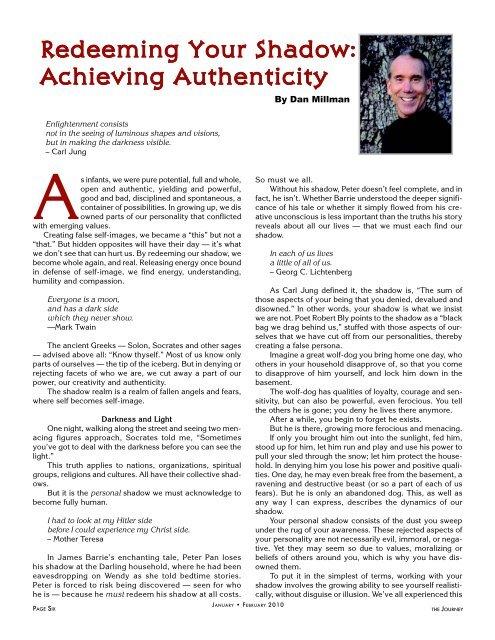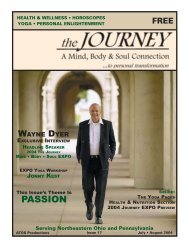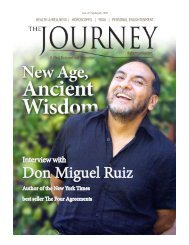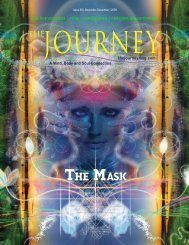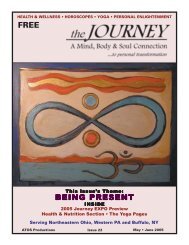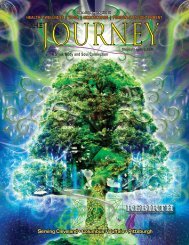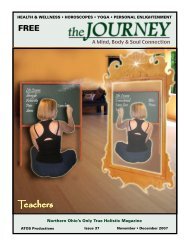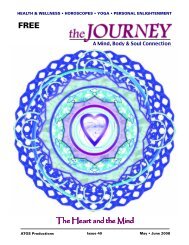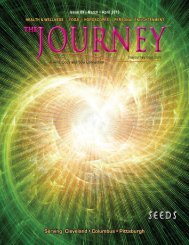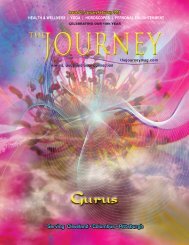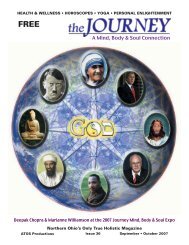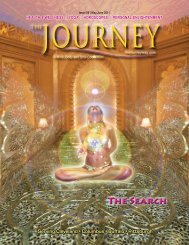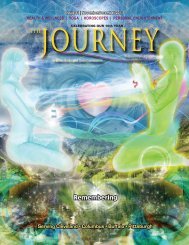January-February 2010 - The Journey Magazine
January-February 2010 - The Journey Magazine
January-February 2010 - The Journey Magazine
Create successful ePaper yourself
Turn your PDF publications into a flip-book with our unique Google optimized e-Paper software.
Redeeming Your Shadow:<br />
Achieving Authenticity<br />
By Dan Millman<br />
Enlightenment consists<br />
not in the seeing of luminous shapes and visions,<br />
but in making the darkness visible.<br />
– Carl Jung<br />
As infants, we were pure potential, full and whole,<br />
open and authentic, yielding and powerful,<br />
good and bad, disciplined and spontaneous, a<br />
container of possibilities. In growing up, we dis<br />
owned parts of our personality that conflicted<br />
with emerging values.<br />
Creating false self-images, we became a “this” but not a<br />
“that.” But hidden opposites will have their day — it’s what<br />
we don’t see that can hurt us. By redeeming our shadow, we<br />
become whole again, and real. Releasing energy once bound<br />
in defense of self-image, we find energy, understanding,<br />
humility and compassion.<br />
PAGE SIX<br />
Everyone is a moon,<br />
and has a dark side<br />
which they never show.<br />
—Mark Twain<br />
<strong>The</strong> ancient Greeks — Solon, Socrates and other sages<br />
— advised above all: “Know thyself.” Most of us know only<br />
parts of ourselves — the tip of the iceberg. But in denying or<br />
rejecting facets of who we are, we cut away a part of our<br />
power, our creativity and authenticity.<br />
<strong>The</strong> shadow realm is a realm of fallen angels and fears,<br />
where self becomes self-image.<br />
Darkness and Light<br />
One night, walking along the street and seeing two menacing<br />
figures approach, Socrates told me, “Sometimes<br />
you’ve got to deal with the darkness before you can see the<br />
light.”<br />
This truth applies to nations, organizations, spiritual<br />
groups, religions and cultures. All have their collective shadows.<br />
But it is the personal shadow we must acknowledge to<br />
become fully human.<br />
I had to look at my Hitler side<br />
before I could experience my Christ side.<br />
– Mother Teresa<br />
In James Barrie’s enchanting tale, Peter Pan loses<br />
his shadow at the Darling household, where he had been<br />
eavesdropping on Wendy as she told bedtime stories.<br />
Peter is forced to risk being discovered — seen for who<br />
he is — because he must redeem his shadow at all costs.<br />
JANUARY • FEBRUARY <strong>2010</strong><br />
So must we all.<br />
Without his shadow, Peter doesn’t feel complete, and in<br />
fact, he isn’t. Whether Barrie understood the deeper significance<br />
of his tale or whether it simply flowed from his creative<br />
unconscious is less important than the truths his story<br />
reveals about all our lives — that we must each find our<br />
shadow.<br />
In each of us lives<br />
a little of all of us.<br />
– Georg C. Lichtenberg<br />
As Carl Jung defined it, the shadow is, “<strong>The</strong> sum of<br />
those aspects of your being that you denied, devalued and<br />
disowned.” In other words, your shadow is what we insist<br />
we are not. Poet Robert Bly points to the shadow as a “black<br />
bag we drag behind us,” stuffed with those aspects of ourselves<br />
that we have cut off from our personalities, thereby<br />
creating a false persona.<br />
Imagine a great wolf-dog you bring home one day, who<br />
others in your household disapprove of, so that you come<br />
to disapprove of him yourself, and lock him down in the<br />
basement.<br />
<strong>The</strong> wolf-dog has qualities of loyalty, courage and sensitivity,<br />
but can also be powerful, even ferocious. You tell<br />
the others he is gone; you deny he lives there anymore.<br />
After a while, you begin to forget he exists.<br />
But he is there, growing more ferocious and menacing.<br />
If only you brought him out into the sunlight, fed him,<br />
stood up for him, let him run and play and use his power to<br />
pull your sled through the snow; let him protect the household.<br />
In denying him you lose his power and positive qualities.<br />
One day, he may even break free from the basement, a<br />
ravening and destructive beast (or so a part of each of us<br />
fears). But he is only an abandoned dog. This, as well as<br />
any way I can express, describes the dynamics of our<br />
shadow.<br />
Your personal shadow consists of the dust you sweep<br />
under the rug of your awareness. <strong>The</strong>se rejected aspects of<br />
your personality are not necessarily evil, immoral, or negative.<br />
Yet they may seem so due to values, moralizing or<br />
beliefs of others around you, which is why you have disowned<br />
them.<br />
To put it in the simplest of terms, working with your<br />
shadow involves the growing ability to see yourself realistically,<br />
without disguise or illusion. We’ve all experienced this<br />
THE JOURNEY


